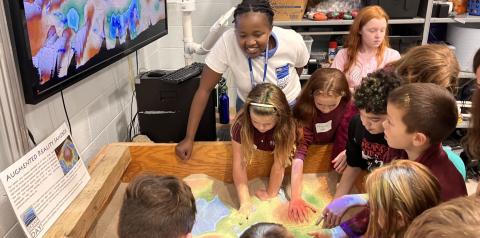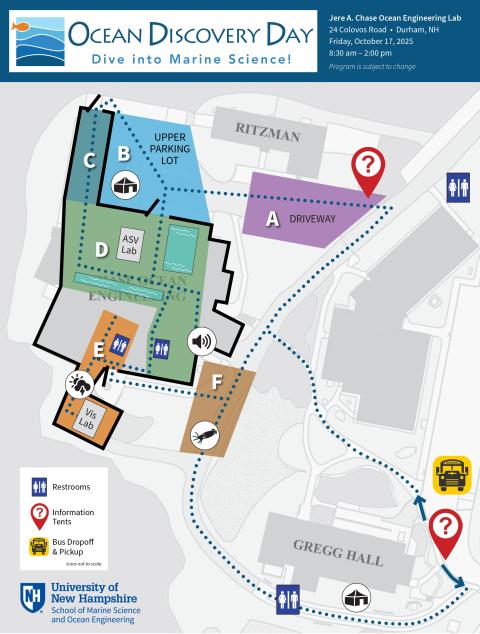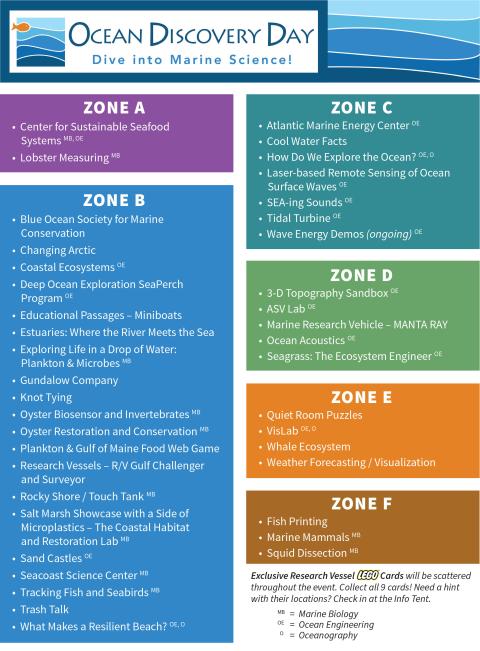
Although the general public is welcome, this day is specifically designed for educators and organizations to bring students to talk to scientists, operate an ROV, learn about ocean mapping, ocean acoustics and check out the 3D visualization lab. Students will get their hands wet while exploring our ecosytems and touching live sea creatures. This event is FREE!
When
Friday October 23, 2026
8:30 am - 2:00 pm
Where
UNH Jere A. Chase Ocean Engineering Laboratory*
24 Colovos Road
Durham, NH 03824
*Parking is not available at this event location. Parking information will be updated below when it becomes available.
Highlights from ODD Student Day 2024
Registration
Event Information
Please note some of the information reflects information for Ocean Discovery Day 2024. This is for reference only and will be updated when new information is received.
Here is a sampling of our 2025 activities!
- 3-D Topography Sandbox - Possibly the coolest sandbox ever! You can "move mountains" with our 3D topography sandbox. Every hill, valley, or mountain you create in the sand will automatically change color to match its new "elevation" – and it's all projected on the screen!
- Aquaculture – Integrated multi-trophic aquaculture (IMTA) is a self-contained aquaculture system that allows multiple species to grow at the same time within a single floating structure. “Multi-trophic” refers to levels of a food web. Each of the different species in the IMTA system provides a benefit to the others: Steelhead trout, blue mussels, kelp and dulse. Find out why aquaculture is important to the local economy
- Autonomous Surface Vehicles – These unmanned surface vehicles play a vital role in collecting data for our researchers.
- Blue Ocean Society – With a mission to protect marine life in the Gulf of Maine through research, education, and inspiring action. Learn more about their efforts and whales through fun interactive activities.
- Changing Arctic – The Arctic is warming three times faster than the rest of the globe. Come join the Convergent Arctic Research Perspectives and Education (CARPE) students and faculty to learn about glaciers, permafrost, and how the warming Arctic is affecting animals and people.
- Coastal Ecosystems – Learn about some amazing creatures and coral that we find in the oceans.
- Estuaries – Estuaries occur where "rivers meet the sea." They provide critical wildlife habitat, nurseries for many marine species, buffering from coastal flooding, recreational enjoyment, and safe harbor for marine commerce and the maritime industry. New Hampshire is home to two major estuaries: the Great Bay Estuary and the Hampton-Seabrook Estuary.
- Fish Printing – Creating art with fish!
- The Gundalow Company - A gundalow is a shallow drafted type of cargo barge, once common in the Gulf of Maine's rivers and estuaries. The Gundalow Company mission is to protect the Piscataqua Region's Maritime heritage and environment through education and action. Representatives will be on hand to talk about educational opportunities at the Gundalow Company.
- Immersive Deep Sea Room – How do we explore the ocean? Lean all about the technologies that our researchers use to explore the deep.
- Knot Tying - Proper knot tying it critical for research vessel safety. You will have the opportunity to try your hand at knot tying.
- Lobsters! – Have you ever measured a lobster? How about banding a lobster? Give both a try at this exhibit!
- MANTA RAY: Marine Research Vehicle - The Marine And Naval Technological Advancements for Robotic Autonomy (MANTA RAY) group is a multi-vessel project bringing together multiple departments in STEM at UNH. The MANTA RAY robotic will be demonstrated in the Engineering Tank.
- Marine Mammals – Ever wonder how a whale stays warm in the fridge ocean waters or how long is a humpback whale? Visit the Marine Mammals table to find the answers to both questions and more!
- Ocean Acoustics – Participants will have an opportunity to hear the different sounds of animals as they interact in their underwater environment.
- Ocean Visualization – Researchers collect and data this data is transferred into advanced visualization tools through the “VisLab”.
- Oyster Biosensor & Invertebrates – Ocean changes influences the behavior and health of coastal marine invertebrates. Researchers will show you how they are using biosensors to monitor filtering behavior in shellfish
- Plankton & Microbes – Exploring life in a drop of water
- Rocky Shore/Marine Touch Tank – What creatures might you find in the inter tidal zones? Have an opportunity to see and touch those creatures.
- Scale Floating Wind Turbine Demonstrations – Head on over to our tow/wave tank to see a turbine in action!
- Seacoast Science Center – The Seacoast Science Center will be highlighting the importance of the intertidal zone, and an invasive species to be on the look out for! Join us to help gather citizen science data on invasive european green crabs. Students and participants will get an up close look at green crabs, and interact with fun intertidal zone activities.
- Seagrass: The Ecosystem Engineer! – Explore the ways that engineers and ecologist at UNH study how seagrass interacts with its aquatic environment through live demonstrations, and craft your own eelgrass plant!
- SEA-ing Sounds – A sound-based scavenger hunt!
- Shake It Up: Science Fun with Beach Sand – This exhibit will demonstrate how beach sand plays a role in shaping beaches and coastal areas. Different sand grain sizes can be observed. The impact of different sand grain sizes on the shape or slope of a beach will be investigated. The process of momentary sand liquefaction (similar to quicksand!) will be demonstrated in real time and audience members have a chance to create their own momentary sand liquefaction event. Sand liquefaction will be discussed in relation to coastal structures and communities.
- Shellfish Behavior and Health Monitoring – Learn how ocean changes influences the behavior and health of coastal marine invertebrates.
- Squid Dissection – Dissect a squid! This is a popular activity that takes approximately 30 minutes. Participants can expect to wait in line for the activity. Place holding is not allowed.
- Tidal Turbine – Tidal turbines convert fast-flowing tidal currents into electric energy. Two different types of turbines, axial flow turbines or cross-flow turbines can be used.
- Trash Talk - Learn about ocean trash and how it travels from the beaches of New England to the depths of the ocean through hands-on activities.
- Water Characteristics
- Wave Energy Demonstrations
- Weather Forecasting/Visualization – Check out the interactive weather forecasting map.
Wind Turbines – Floating wind turbines are used offshore to generate electricity. These turbines are enormous! We have a scaled model for you to see as you learn more about offshore wind energy.
…And so much more!


- Ocean Discovery is designed as a self-guided tour. Plan on approximately 2 ½-3 hours to complete. This event takes place both inside and outside. Please be prepared for the weather.
- A program list is available on the website. Please note, the program is accurate at the time of posting, but may change prior to the event. Programs and maps will be available at the information tent the day of the event.
- Most activities are open activities without scheduled times.
- Upon arrival, a school representative should proceed to the information tent to check-in. Each school will be asked to provide an on-site emergency contact name and phone number. Programs and maps will be distributed to the representative.
- Larger groups should be divided into groups of eight or less.
- The Jere A. Chase Ocean Engineering Laboratory is a working research facility. Therefore it is important that students are accompanied by an adult at all times. Unaccompanied students will be accompanied to the information tent.
- The Laboratory houses two large tanks. Under no circumstances are individuals allowed to sit or stand upon the walls of the tanks. Individuals are not allowed on the pool deck without a life jacket. Life jackets are available at the tank. Individuals violating these rules will be asked to leave the premises.
- A note about squid dissecting - this activity takes approximately 30-40 minutes to complete. The activity will be offered on the half hour and limited space is available at each session. Participation is on a first-come, first-served basis.
- This is a rain or shine event, so please dress accordingly.
- Ample restroom facilities will be available.
- Food will be available within walking distance. For more information, please visit the UNH Dining website.
- An unsecured area will be provided with limited storage of back packs. This is an unsecured location and will not be monitored by event staff. UNH will not be held responsible for items left in this area.
Special Accommodations and ADA Parking
Those needing reasonable accommodations including ADA parking should contact the Marine School office at marine.information@unh.edu or (603) 862-2959.
Instructions for schools arriving by bus
The bus drop-off and pick-up location is in the parking lot directly in front of the Health Services Simulation Center located on 25 Colovos Road, Durham, NH. Please find the bus map here:
- odd.busmap24.pdf (264.47 KB)
Parking instructions for those arriving by car
Please note that parking at the event site is not available. All participants must park in visitor parking located throughout the campus. We recommend that participants park in the Campus Crossing lot where 200 parking spaces are available. Please reference the Visiting Parking website for locations and lot specific restrictions. UNH uses Pay-By-Phone by ParkMobile at visitor parking areas and spaces throughout campus.
Those needing reasonable accommodations including ADA parking should contact the Marine School office at marine.information@unh.edu or (603) 862-2959.
Subscribe to our email list to be notified when new information becomes available.